Entertainment
What would wider recognition of Palestine mean for Palestinians and Israel?
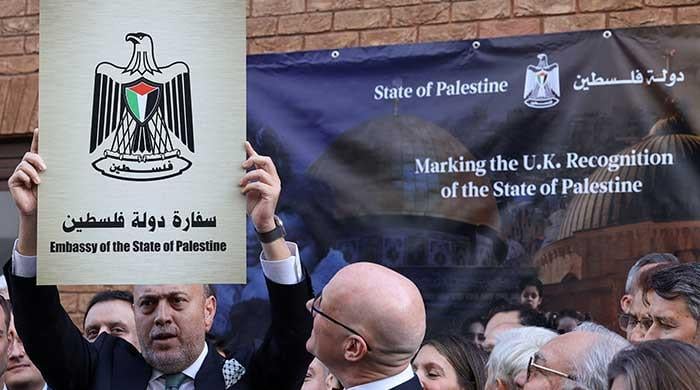
Several more countries have formally recognised Palestinian statehood at a world summit by France and Saudi Arabia, a day after Australia, Britain, Canada and Portugal took the step, angering Israel.
Status of Palestinian statehood
The Palestine Liberation Organisation declared an independent Palestinian state in 1988, and most of the global South quickly recognised it. Today, about 150 of the 193 UN member states have done so.
Israel’s main ally, the United States, has long said it supports the goal of a Palestinian state, but only after the Palestinians and Israel agree on terms for a two-state solution at negotiations. Until recent weeks, the major European powers shared this position.
However, no such Israeli-Palestinian negotiations have been held since 2014, and Israeli Prime Minister Benjamin Netanyahu has now said there will never be a Palestinian state.
A delegation representing the State of Palestine has observer status at the UN — but no voting rights. No matter how many countries recognise Palestinian independence, full UN membership would require approval by the Security Council, where Washington has a veto.
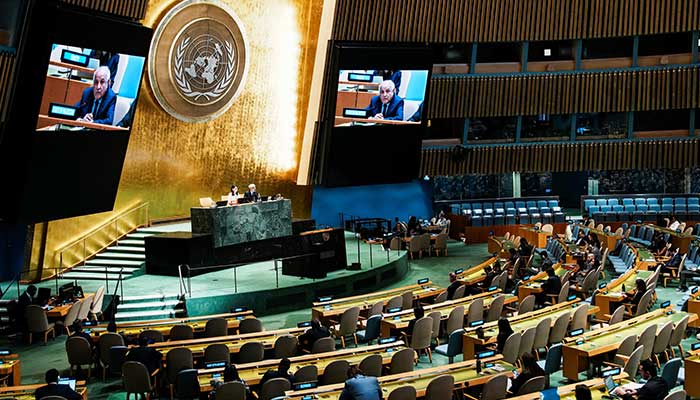
Palestinian diplomatic missions worldwide are controlled by the Palestinian Authority, which is recognised internationally as representing the Palestinian people.
The PA, led by President Mahmoud Abbas, exercises limited self-rule in parts of the Israeli-occupied West Bank under agreements with Israel. It issues Palestinian passports and runs the Palestinian health and education systems.
The Gaza Strip has been administered by the Hamas since 2007, when it drove out Abbas’s Fatah movement after a brief civil war.
Embassies?
Palestinian diplomatic missions in countries recognising a Palestinian state are expected to be upgraded to the full status of embassies. But countries are not expected to be able to open new, fully-fledged embassies in the Palestinian territories, where Israel controls access.
Around 40 countries have consulates or representative offices either in the PA’s West Bank base Ramallah or in parts of Jerusalem captured by Israel in 1967, where the Palestinians hope to have their capital.
Israel considers all of Jerusalem its own undivided capital. Fully-fledged embassies in Israel are mostly located in Tel Aviv, although the US moved its embassy to Jerusalem during President Donald Trump’s first term.
Aim of recognition
Countries moving to recognise a Palestinian state say the move is intended to put pressure on Israel to end its devastating assault on Gaza, curtail the building of new Jewish settlements in the occupied West Bank and recommit to a peace process with the Palestinians.
French President Emmanuel Macron, the first leader of a major Western power to endorse recognition, said the move would be accompanied by a commitment by the PA to enact reforms, which would improve Palestinian governance and make it a more credible partner for the post-war administration of Gaza.
What does recognition means in practice?
Those who see recognition as a mere gesture point to the limited influence in the conflict of countries such as China, India, Russia and many Arab states that recognised Palestinian independence decades ago.
Without a full seat at the UN or control of its own borders, the PA has only limited ability to conduct bilateral relations.
Israel restricts access for goods, investment and educational or cultural exchanges. There are no Palestinian airports. The landlocked West Bank can be reached only through Israel or through the Israeli-controlled border with Jordan, and Israel now controls all access to the Gaza Strip since capturing Gaza’s border with Egypt during the ongoing war.
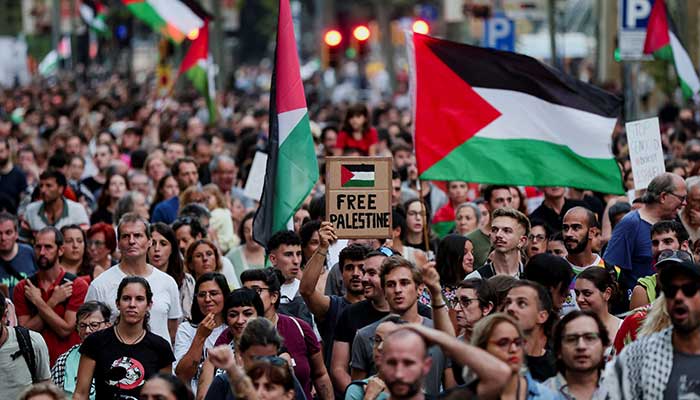
Still, countries planning recognition and the PA itself say it would be more than an empty gesture.
Husam Zomlot, head of the Palestinian mission to the UK, said it could lead to partnerships between entities on an equal footing.
It might also force countries to review aspects of their relationships with Israel, said Vincent Fean, a former British diplomat in Jerusalem.
In Britain’s case, this might result in banning products that come from Israeli settlements in the occupied Palestinian territories, he said, even though the practical impact on the Israeli economy would be minimal.
US, Israel’s reaction
Israel, facing a global outcry over its conduct in the Gaza war, says recognition rewards Hamas for the attacks on Israel that precipitated the war in October 2023.
“A Palestinian state will not be established west of the Jordan River,” PM Netanyahu said.
The US opposes the recognition moves by its European allies. It has imposed sanctions on Palestinian officials, including blocking Abbas and other PA figures from attending the UN General Assembly by denying and revoking visas.
Entertainment
See Hailey Bieber’s Valentine Day tribute for Justin Bieber

Hailey Bieber gave fans a rare peek into her Valentine’s Day celebrations with husband Justin Bieber, sharing a light-hearted and affectionate moment that kept things personal and understated.
The Rhode founder posted to her Instagram Stories on Saturday, revealing a handwritten note that read, “You are my forever Valentine,” finished with a red kiss mark.
She followed it with a close-up snap of chocolate-covered strawberries, suggesting the couple marked the day with a cosy, low-key treat rather than anything over the top.
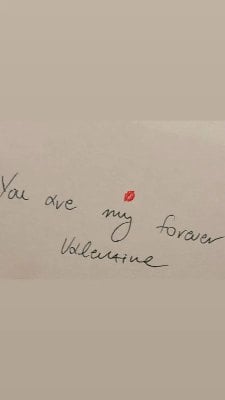
Hailey, 29, and Justin, 31, have been married since 2018 and are parents to a son, Jack Blues, who is just over a year old.
While the couple tend to keep their family life private, Hailey’s Valentine’s Day posts offered a gentle snapshot of their relationship at home.
Away from the holiday romance, Hailey also found herself in the spotlight last week after stepping out at the Sydney premiere of Wuthering Heights.
The model turned heads in a plunging, completely sheer black lace gown by Saint Laurent.
Hailey also leaned into romance in another way ahead of Valentine’s Day by sharing a post suggesting that her bond with Justin is written in the stars.
On Friday, Feb. 13, she reposted a picture from an astrology-focused meme account highlighting their zodiac signs. Born on Nov. 22, Hailey is a Sagittarius, while Justin, who turns 32 on March 1, is a Pisces.
The post showed the couple in PDA, with “Sagittarius” written above Hailey and the phrase “a Pisces who takes them places and lets them be wild” across Justin.
The post, which explored how different signs connect with Sagittarius in relationships, was captioned, “Which sign is our valentine this year #sagittarius #zodiac #astrology #explore #horoscope.”
Hailey liked the post and reshared the image, which was originally taken on holiday and had appeared in a black-and-white Instagram photo dump she shared back in November.
At the time, Justin reacted simply, commenting, “Oh my f—in god.”
Together for nearly eight years, the Biebers continue to share glimpses of their relationship in subtle ways, blending quiet family moments, public appearances and playful nods to their connection as Valentine’s Day came around once again.
Entertainment
Maya Hawke, Christian Lee Hutson tie knot in Valentine’s Day Ceremony
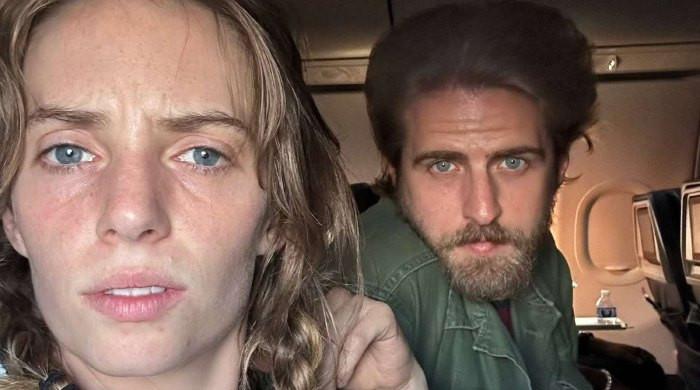
Maya Hawke and Christian Lee Hutson have officially tied the knot, exchanging vows in a romantic Valentine’s Day ceremony in New York City on Feb. 14.
The couple said “I do” during a low-key but star-studded wedding, marking a meaningful milestone in a relationship that began as a long friendship.
According to PEOPLE, the ceremony took place in the city they both call home, with close family and friends in attendance.
For the special day, Hawke wore a white wedding dress with a classic ball gown silhouette, paired with a lace veil and an oversized, feathery white coat that added a winter-ready touch.
Hutson kept things timeless in a black tuxedo, complete with a white shirt, vest and a floral boutonniere.
Hawke’s parents, Uma Thurman and Ethan Hawke, were both present to support their daughter.
Thurman was photographed in a light blue, floor-length look with matching shoes, while Ethan Hawke wore an all-black ensemble and was seen holding his daughter’s bouquet as he walked alongside her.
He later walked Hawke down the aisle. Also attending was Hawke’s brother, Levon Roan Thurman-Hawke.
Several of Hawke’s Stranger Things castmates were spotted at the ceremony, including Finn Wolfhard, Joe Keery, Gaten Matarazzo, Caleb McLaughlin, Sadie Sink and Natalia Dyer, underscoring just how personal the celebration was for the actress.
Following the ceremony, the newlyweds and their guests made their way to a reception at The Players Members Club, where the celebrations continued for hours.
The wedding comes after years of creative and personal collaboration between Hawke and Hutson.
The pair were friends for four years before their relationship turned romantic while working together on Hawke’s 2024 album, Chaos Angel.
Speaking on The Zach Sang Show in June 2024, Hawke praised the foundation of their relationship, saying, “I cannot recommend highly enough dating your friends. It’s the best.”
Hutson subtly confirmed their engagement last year during a radio interview when Hawke was referred to as his “fiancée,” replying simply, “Yeah.”
Not long after, Hawke was photographed in New York wearing a diamond ring, fuelling further speculation.
Music has remained central to their bond.
Hutson has appeared on Hawke’s albums Moss and Chaos Angel, while Hawke features on his most recent release, Paradise Pop. 10, and even joined him on stage during parts of his 2025 tour.
Reflecting on their partnership, Hawke previously said Hutson had been “so encouraging” as she grew into her identity as a musician.
Now married, the couple’s Valentine’s Day wedding feels like a fitting next chapter for two artists whose friendship, creativity and romance have grown hand in hand.
Entertainment
Global pandemic of ‘shrinking attention span’
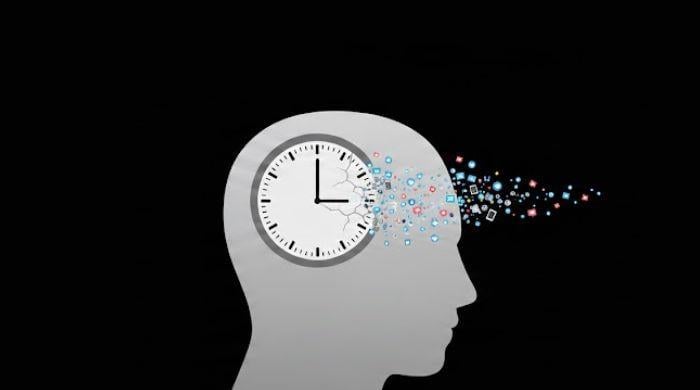
Attention span refers to the duration for which a person can maintain concentration on a single task, activity, or stimulus.
Being a crucial part of humans’ cognitive functioning, it influences how we learn, work, and interact with the surroundings.
The shrinking attention span is more like a global pandemic that has affected every individual on the planet directly or indirectly. Research shows that the average attention span of a human is only 8.25 seconds which is less than that of a goldfish (9 seconds).
This is considered one of the most documented cognitive shifts of the 21st century. Research led by Dr Gloria Mark at the University of California, Irvine, has traced the average duration of focused attention on digital screens over the 20-year period.
The research found that in 2004, the average attention span was approximately 150 seconds which reduced to 75 seconds in 2012. Recent data from 2012 reveals that this figure has decreased to 75 seconds. While in 2024, the average attention span has plummeted to just 47 seconds.
This suggests a broader restructuring of the human cognitive baseline. The decline is primarily linked to the disruption between two main attention systems i.e., the involuntary system (reacts to external stimuli) and the goal-oriented system (enables sustained focus).
Digital platforms especially social media are engineered to trigger the involuntary system via constant notifications, vibrant visual cues, and algorithmic unpredictability. This constant trigger systematically fatigues the prefrontal cortex (region of brain responsible for executive function and impulsive control).
How does the human brain shift attention?
With each instance of attention shifting, “switching cost” occurs. It refers to the measurable reduction in performance particularly slower reacting times and increased errors that usually happen when the brain shifts attention from one task, rule, or mental set to another.
As human brain works as a serial processor, it can’t multitask in the literal sense. Rather, it engages in rapid task-switching. To process each switch, it requires several minutes for the brain to regain its focus.
In a digital environment dominated by short-form content, where a user consumes different content of 15-to-30-second videos in a single session, the brain remains in a continuous state of partial attention.
This continuous state prevents the human’s cognitive system from entering a flow state, a condition where the brain can develop deep engagement that’s required for complex problem solving and creative synthesis.
Additionally, the constant push to check notifications from social media platforms activates the sympathetic nervous system that keeps the body in a state of low-level “fight or flight” mode.
The psychological stress response, measured by high heart rate and perceived stress levels, contributes to the modern epidemic of digital burnout and generalised anxiety.
-

 Business6 days ago
Business6 days agoAye Finance IPO Day 2: GMP Remains Zero; Apply Or Not? Check Price, GMP, Financials, Recommendations
-

 Fashion5 days ago
Fashion5 days agoComment: Tariffs, capacity and timing reshape sourcing decisions
-

 Tech6 days ago
Tech6 days agoRemoving barriers to tech careers
-

 Fashion6 days ago
Fashion6 days agoADB commits $30 mn to support MSMEs in Philippines
-

 Entertainment6 days ago
Entertainment6 days ago‘Harry Potter’ star David Thewlis doesn’t want you to ask him THIS question
-
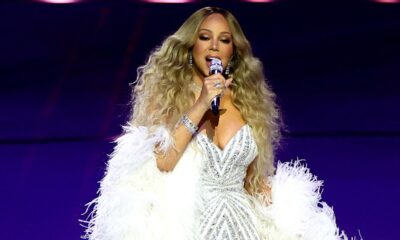
 Sports6 days ago
Sports6 days agoWinter Olympics opening ceremony host sparks fury for misidentifying Mariah Carey, other blunders
-

 Fashion6 days ago
Fashion6 days agoSaint Laurent retains top spot as hottest brand in Q4 2025 Lyst Index
-
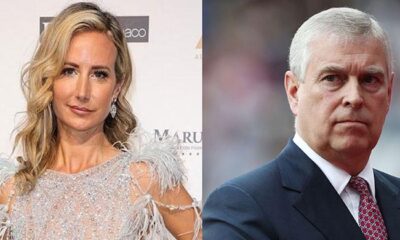
 Entertainment1 week ago
Entertainment1 week agoVictoria Hervey calls out Andrew’s powerful circle in Epstein revelations





